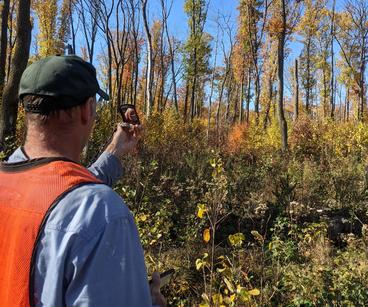
The following are strategies related to land management and protection that are included in the Midwest Climate Adaptation Science Center's 2023-2026 Science Agenda.
- 1.3 Assess potential impacts of extreme rainfall on fish and wildlife management infrastructure.
- 1.4. Determine optimal design and placement of culverts and fish passage structures to protect aquatic habitat and connectivity under future precipitation patterns.
- 1.5. Evaluate the efficacy of management strategies to limit negative effects of flooding, sedimentation, and contaminants on aquatic fish, wildlife, ecosystems, and cultural resources.
- 1.11. Assess the effects of human-centric adaptation on water quality and quantity for fish, wildlife, and ecosystems.
- 2.7. Identify management strategies to facilitate small-scale (e.g., microclimate), short-term, or long-term refugia.
- 4.7. Assess the potential for range shifts to or from Tribal lands, or local extirpation of focal species from Tribal lands.
- 4.6. Identify optimal future habitat (e.g., refugia, connectivity to) for at-risk or priority species.
- 4.8. Evaluate the effects of climate-induced changes in land use on aquatic and terrestrial fish, wildlife, and ecosystems.
- 5.1. Assess the feasibility and effectiveness of current and potential ecological restoration goals under future conditions.
- 5.2. Advance climate-informed optimization of protected lands for fish, wildlife, ecosystems, and cultural resources.
- 5.4. Provide climate-informed decision science in the selection, application, and siting of restoration and ecosystem management (e.g., prescribed burning, water control, grazing, siting, and seed selection/planting).
Read the full Science Agenda.
